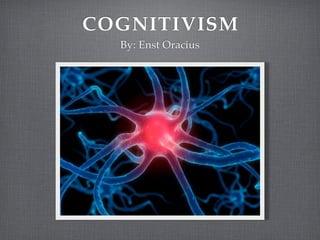Oracius theory
•Download as KEY, PDF•
1 like•324 views
cognitivism
Report
Share
Report
Share

Recommended
More Related Content
What's hot
What's hot (19)
Strategies for developing creativity and critical thinking 

Strategies for developing creativity and critical thinking
Similar to Oracius theory
Similar to Oracius theory (20)
16.2 Priority 1 Practice Intentional TeachingIntentional te.docx

16.2 Priority 1 Practice Intentional TeachingIntentional te.docx
Recently uploaded
https://app.box.com/s/7hlvjxjalkrik7fb082xx3jk7xd7liz3TỔNG ÔN TẬP THI VÀO LỚP 10 MÔN TIẾNG ANH NĂM HỌC 2023 - 2024 CÓ ĐÁP ÁN (NGỮ Â...

TỔNG ÔN TẬP THI VÀO LỚP 10 MÔN TIẾNG ANH NĂM HỌC 2023 - 2024 CÓ ĐÁP ÁN (NGỮ Â...Nguyen Thanh Tu Collection
God is a creative God Gen 1:1. All that He created was “good”, could also be translated “beautiful”. God created man in His own image Gen 1:27. Maths helps us discover the beauty that God has created in His world and, in turn, create beautiful designs to serve and enrich the lives of others.
Explore beautiful and ugly buildings. Mathematics helps us create beautiful d...

Explore beautiful and ugly buildings. Mathematics helps us create beautiful d...christianmathematics
Recently uploaded (20)
TỔNG ÔN TẬP THI VÀO LỚP 10 MÔN TIẾNG ANH NĂM HỌC 2023 - 2024 CÓ ĐÁP ÁN (NGỮ Â...

TỔNG ÔN TẬP THI VÀO LỚP 10 MÔN TIẾNG ANH NĂM HỌC 2023 - 2024 CÓ ĐÁP ÁN (NGỮ Â...
Energy Resources. ( B. Pharmacy, 1st Year, Sem-II) Natural Resources

Energy Resources. ( B. Pharmacy, 1st Year, Sem-II) Natural Resources
Explore beautiful and ugly buildings. Mathematics helps us create beautiful d...

Explore beautiful and ugly buildings. Mathematics helps us create beautiful d...
ICT Role in 21st Century Education & its Challenges.pptx

ICT Role in 21st Century Education & its Challenges.pptx
Measures of Dispersion and Variability: Range, QD, AD and SD

Measures of Dispersion and Variability: Range, QD, AD and SD
Mixin Classes in Odoo 17 How to Extend Models Using Mixin Classes

Mixin Classes in Odoo 17 How to Extend Models Using Mixin Classes
On National Teacher Day, meet the 2024-25 Kenan Fellows

On National Teacher Day, meet the 2024-25 Kenan Fellows
Food Chain and Food Web (Ecosystem) EVS, B. Pharmacy 1st Year, Sem-II

Food Chain and Food Web (Ecosystem) EVS, B. Pharmacy 1st Year, Sem-II
Russian Escort Service in Delhi 11k Hotel Foreigner Russian Call Girls in Delhi

Russian Escort Service in Delhi 11k Hotel Foreigner Russian Call Girls in Delhi
Asian American Pacific Islander Month DDSD 2024.pptx

Asian American Pacific Islander Month DDSD 2024.pptx
Oracius theory
- 1. COGNITIVISM By: Enst Oracius
- 2. COGNITIVISM (MENU) What? Who? How? My Classroom
- 3. WHAT IS COGNITIVISM? Cognitivism was officially recognized around 1956. In science, cognition refers to mental processes. These processes include attention, remembering, producing and understanding language, solving problems, and making decisions. Cognitivist replaced behaviorism in 1960s as the dominant paradigm.
- 4. WHAT IS COGNITIVISM? Video Cognitivism is the study in psychology that focuses on mental processes, including how people perceive, think, remember, learn, solve problems, and direct their attention to one stimulus rather than another. Cognitive theory, activities like thinking and remembering seem like a behavior, thus providing an avenue to use behavior analysis to measure their effect on learning.
- 5. KEY FIGURES Alan Paivio (1925- Robert Gagne (1916-2002) Howard Gardner (1943-) Benjamin Bloom (1913-1999)
- 6. ROBERT GAGNE He was born in 1916-2002 He was a psychologist and educator Mr. Gagne developed his learning theories based on behaviorist's and information processing point of view. He is know for his contribution in the area of cognitive learning hierarchies Mr. Gagne also identified five major categories of learning: verbal information, intellectual skills, cognitive strategies, motor skills, and attitudes. While in the Air Force, he develop some of his ideas for his comprehensive learning theory.
- 7. ROBERT GAGNE • Gagne developed three principles that he viewed as integral for successful instruction: 1. Providing instruction on the set of component tasks that build toward a final task 2. Ensuring that each component task is mastered 3. Sequencing the component tasks to ensure optimal transfer to the final task • To maximize the potential for the internal process of learning to occur, Gagne identified nine events of instruction.
- 8. HOW WILL WE OBSERVE THIS? Teachers By allowing children to interact with one another By placing within their grasp block and slot games Also this can be captured by putting different toys out We can analyze the children when they draw or write
- 9. HOW WILL WE OBSERVE THIS? Children They would play matching games They would be given task based off of instructions The students would do normal everyday assignments
- 10. MY CLASSROOM This theory would help with the different groups It would determine the different stations of activities Which level each kid would be on It will shape how I instruct the children based on their learning perspective It will help with how the children are tested
- 11. MY CLASSROOM I would utilize Gagne five areas of learning outcomes I would also use his nine events of instruction
Editor's Notes
- \n
- \n
- \n
- \n
- \n
- \n
- \n
- \n
- \n
- \n
- \n